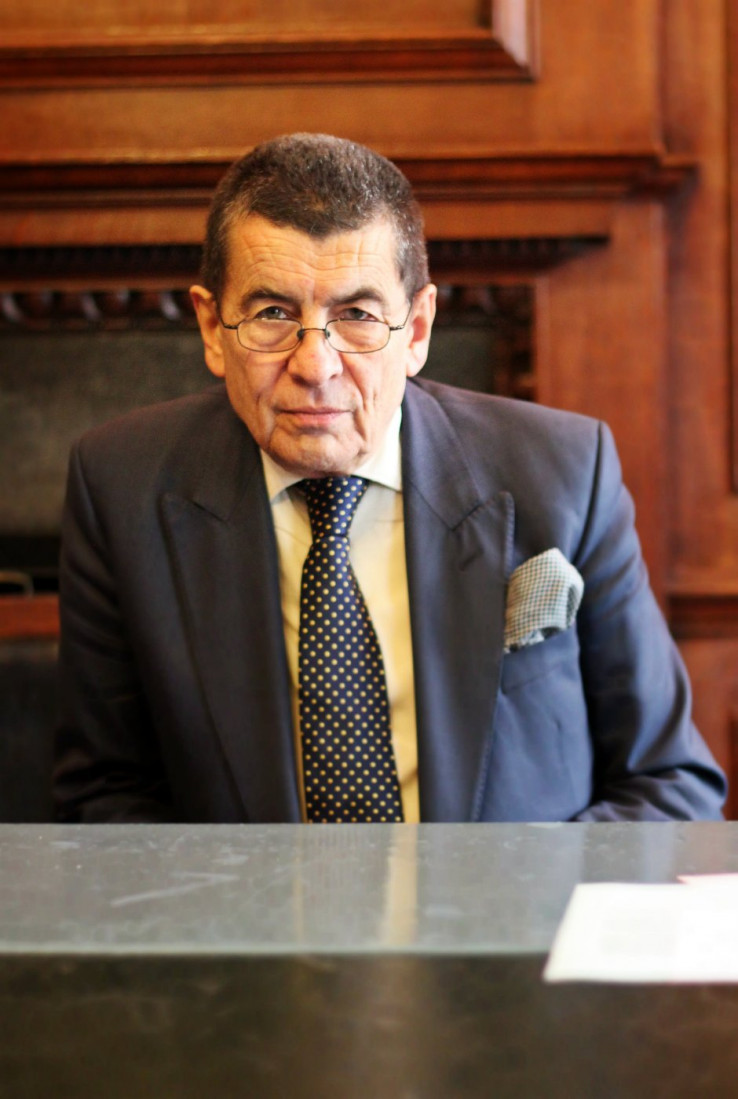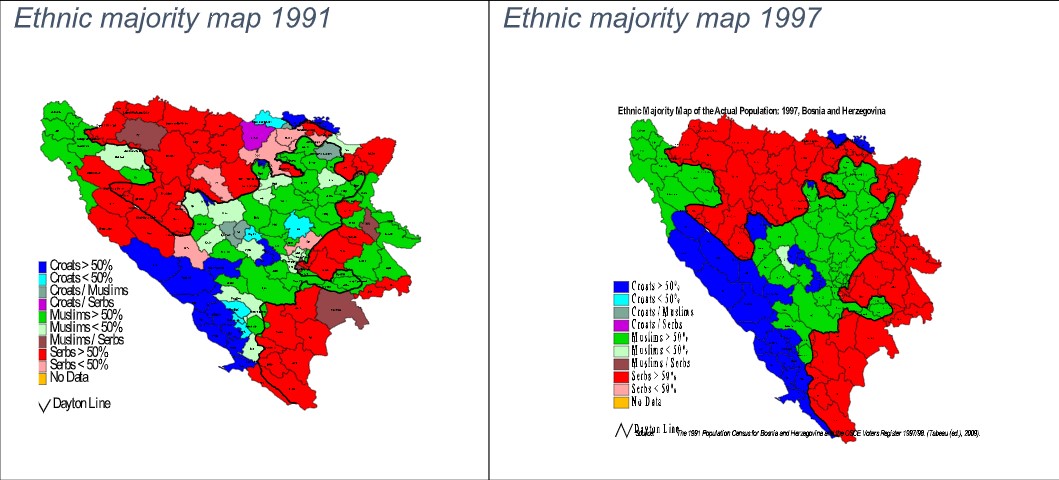Nice: Bosnia had the right to a laurel wreath as a sign of victory. Archive
Nice: Bosnia had the right to a laurel wreath as a sign of victory. Archive
If so then facts that come from Dr Nevenka Tromp’s seminal book, The Unfinished Trial, published in 2016 (Routledge) may be of help. The book was historically accurate and prescient. But it is not clear to me that either its view of the past or its forecast for the future have gained the attention in Bosnia due to them.
Before getting to the truths in her book, three other things.
Dr Tromp and I found ourselves involved in three scandals that demonstrate the difficulty of getting access for the public to material relevant to Bosnia’s past and future and – sorry to say – the difficulty of getting Bosnians to use material once it is accessible.
The terrible crisis of the 1990s
First, the Supreme Defence Council Records which were largely obscured from public view by a strange decision of the Prosecutor at the ICTY. Dr Tromp and I went as far as we could, maybe at some personal risk, to expose the process that had allowed this to happen.
The unseen parts of the documents were thought - in public discussion in Bosnia - to be the answers to the shortcomings of the ICJ genocide Judgment. By chance, they became available later in another trial. And it seemed then that almost no one analysed them (quite hard work, by the way) for the strong public debate that should have followed. Interest in them had died.
Second, intercepts of phone calls between Milošević and Mladić at the time of Srebrenica. I took steps to publicise their existence, the need for them to be made available and (to the extent I could) how they had been suppressed. Follow-up from those citizens in Bosnia whose interests would have been served by the intercepts? Little - none.
Third, at the end of 2016 Dr Tromp and I were drawn into a venture to suggest that President Bakir Izetbegović was doing his best to correct the ICJ Judgment, when he wasn’t. Who knows what was going on. Not Dr Tromp and me. The document filed at the ICJ on behalf of Bosnia and its people has never been made public. Why not? It might lead to something significant about the overall history that caused the President to act as he did.
Are Bosnia and its citizens doing enough now - before the moment is lost for ever - to correct the history and drive those who determine Bosnia’s future to work with hard facts. If they expect others to do everything for them they are poor judges of other governments and even of individuals. Bosnia’s terrible crisis of the 1990s is history now. Students at universities in the UK, for example, often enough don’t know where and what the former Yugoslavia was or what happened at Srebrenica.
And when they read about it - if they do – competing accounts pop up and why should they automatically choose the Bosnian version? Especially when the 30- and 40-years olds playing chess for their governments with the pieces of the former Yugoslavia can see such advantages in letting the RS become part of the Serbia proper.
Serbia sees itself as a winner even when it loses. And everybody loves a winner. Does Bosnia see itself as a winner? If Serbia had a book full of straightforward facts as shown in Dr Tromps book but on Serbia’s side, it would use them well and draw on other sources to prove the same essential points. Has Bosnia done that?
I quote some passages at length for readers to take the time to read and about which to think. On P268 (English language hardback version) she explains:
- Although Milošević and his associates avoided any explicit mention of Greater Serbia, their policy of "All Serbs in a Single State" in the 1990s and Greater Serbia plans were very similar.
Milošević had been selected (initially by Serbs in Kosovo) to lead this project of which he was not the creator. He was not even the person who revived the project – and he barely dared to speak its name. The long process of that revival had initially been driven by others who were not inclined to climb into the driver's seat of the vehicle – call it a train - they had fired up and re-started.
Milošević was in a sense simply the driver of the train, although a very willing driver once he had his hands on the controls. The train's progress was blocked by defeats: in Croatia with Operations 'Flash' and 'Storm', in Bosnia when the Dayton Peace Agreement allowed for the existence of Republika Srpska but blocked its immediate annexation by Serbia; in Kosovo when NATO took sides and bombed Serbia into its loss of Kosovo that achieved its surprising independence. But the train was not derailed.
Train driver Milošević was pushed off the footplate as the train slowed down. The train did not stop. It has not stopped. It is rolling still.
- Or, to quit the analogy, the Serb State project is not dead and might never die. It assumes ever new forms – reduced or enlarged – depending on internal and external circumstances. The tragedy for the other unconsidered ethnicities is that Serbia's ideology can only ever be realised through new territorial borders drawn by violence, probably mass violence.
A project that brought even more bloodshed
Do those who determine Bosnia's future take account of this? If not Bosnian Muslims must force them to because the rest of us cannot do this for Bosnia, for you.
P269 "The most alarming conclusion, on one reckoning, may be that even if the international community understood the danger of the Serbian State project this did not stop the project being afforded some support coming as the inevitable consequence of determined international resistance to creation of a Muslim state on the heart of Europe. Better, it might be thought, to tolerate an unfortunate but Christian project that has brought wars and may bring more bloodshed than to see strong Muslim entities in Europe - Milošević’s /Green Transversal- from Bosnia through Kosovo, Albania and Macedonia towards."
The same points apply. Is Bosnia pressing this issue?
P275 "A number of Serbia’s current political elites see the Serbian state project as unfinished business and hope yet to change the western borders of the state, to encompass Republika Srpska. In fact, in 2013, Prime Minister Dačić publicly reiterated the importance for Serbia of insuring preservation of the Bosnian entity, calling it even more important for Serbia than Kosovo."
The last fact takes us back to the 1990s and to these two maps, produced by the demography department of the ICTY and used in lectures by Dr Tromp as one of the easiest ways to explain how the Bosnian tragedy happened by killing Bosnians and by forcing them to leave a land of diversity that was their home.
Maps of ethnic majorities from 1991 and 1997. ICTY
Maps of ethnic majorities from 1991 and 1997. ICTY
The maps show both that and why people – Bosnians and Croats – were ethnically cleansed and murdered. But they should be generating for politicians a slightly more pressing universal human question. What would any of those Muslims who were forced out from the blue, green, pale pink bits on the first map that the war in Bosnia turned red in time for the second map to be drawn answer to the question: "Where is your home?"
I cannot be sure but I expect home is where you were born and where your roots are.
So why – again something covered in Dr Tromp’s book, at page 269 and a point no one made before she did with such force:
- The most notable and concrete of a cluster of associated conclusions is that whatever the international community’s underlying motivations may have been, its invariable response to a Balkan problem was ethnic separation.
They determine destiny
I periodically wonder how much or how little the diplomats in the foreign ministries of the big countries, to whom the Western Balkans is a bit of a game but who likely determine Bosnia’s fate - on their two or so year circulations in and out of foreign ministry desks of countries of minor importance - actually know of the real Bosnian history, even the 1990s history. As Dr Tromp has asked the world to note:
- Witnesses testified that the rumoured partition agreed to as early as the 1991 Karađorđevo meeting had actually enjoyed European support, because Europe was not prepared to allow the formation of a unitary BiH, with a Muslim majority. This – it must be recalled – preceded any significant ethnic violence. Further highly persuasive evidence of European support for this proposed ethnic division can be found in what those who may have supported it in 1991 did in subsequent years. In the period from February 1992 to December 1995, international negotiators proposed five peace plans, all of which were based to varying degrees on the principle of ethnic separation.
The first, the Cutileiro Peace Plan – proposed almost one year after the Karađorđevo meeting and two months before war broke out in BiH – evoked the arrangement Tuđman and Milošević had reportedly discussed at Karađorđevo.
Ethnic separation of BiH was also the basis of the Vance-Owen Peace Plan of 1993, which proposed the creation of ten cantons. During negotiations for the Vance-Owen Plan, violence escalated as Serbs and Croats fought for more territory, anticipating that it would be awarded to them at the negotiating table. Instead, negotiations failed by mid-1993, as they did for two subsequent peace proposals: the Owen-Stoltenberg Peace Plan of 1993 and the Contact Group Peace Plan of 1994, each of which was premised on ethnic separation.
Why has this point not been pushed down the throats of every damned foreigner who dares not say, for example, to Northern Ireland’s Catholic Republican Army (IRA) supporters and those in Northern Ireland of Catholic faith: "Just pack up your belongings and move across the border to the Southern Republic of Ireland; the map will be much tidier and all you Catholics can be in one place and all we Protestants in another with England Wales and Scotland". That is never proposed – not even thought of - for the British problem (and ask similar questions about the Basques, perhaps) – because it would be inhumane. So – push the point deeper down their throats – "Why from the start did you treat the Muslims of Bosnia as inhuman and entitled not to humanity but the reverse. Why did you say to the Muslims of Bosnia "Bad luck that you cannot answer to the question "where is your home?".
I can say it easier than others
One last point that I, as a UK "Brit", can make more easily than others. It is well known, and accepted by many scholars, that Great Britain did not halt Serb aggression against Bosnia because policy makers in Whitehall wanted Serbia and its proxies in Bosnia to prevail.
Britain, for the most part, led an international 'consensus' which, between the summer of 1991 and 1995, benefited the Serb regimes in Belgrade and Pale, respectively, at the expense of the interests of the Bosnian government and other proponents of a multi-cultural society in Bosnia-Herzegovina.
Bosnia was entitled to the laurels of victory not for what happened in an unequal battle of military hardware but because it was attacked without justification by a criminal state and criminal quasi state.
Bosnia must tell the world that and force the world to say it back to Bosnia. Bosnia will finally be the victor and justice can start to be done.

